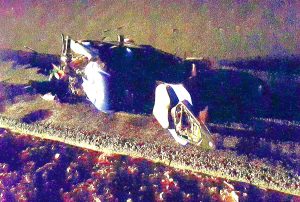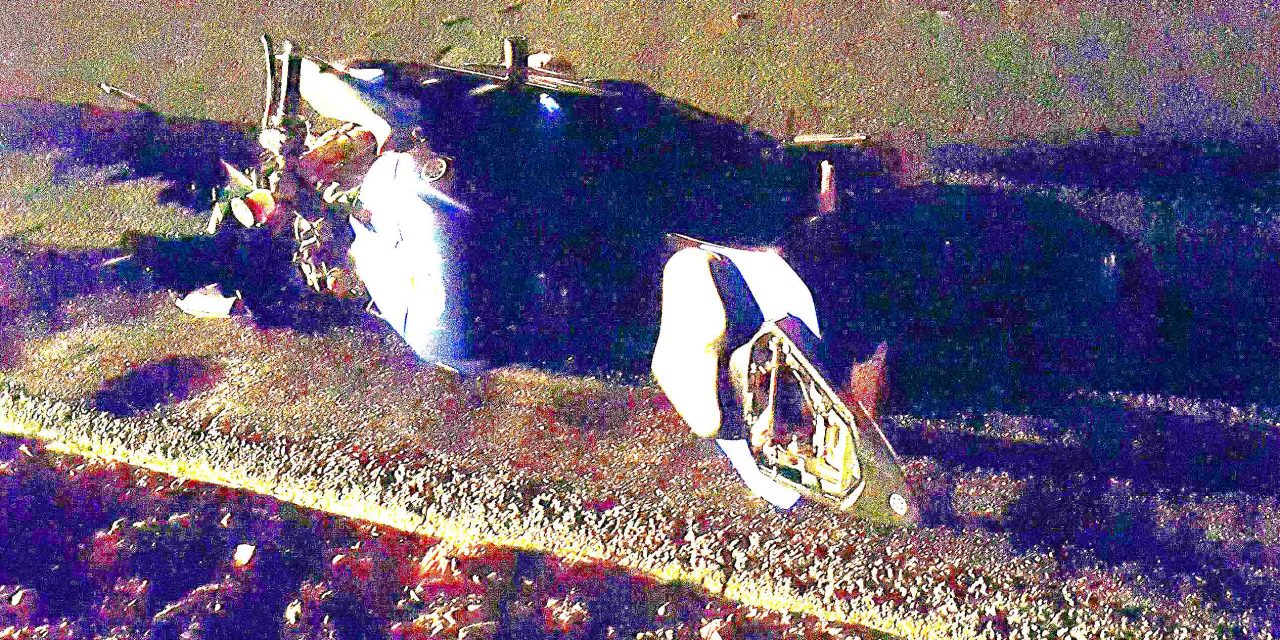
This motorcycle hit the other one
Last night on the way home from my Monday night meditation group meeting just after 9:30 p.m. on the I-15 north, two very fit, agile-looking young men on motorcycles crashed together right before my eyes. Sparks flew everywhere as they collided.
I had been going about 75 mph so they had to be doing at least 85.
One of them had just passed me on the left like a bullet, slipping through the narrow space between me and the car just ahead of me in his lane. He crossed diagonally in front of my Toyota in the dark, way too close to my left front fender. The other motorcycle zoomed past me on my right going just as fast.
Surrounded by the two loud engines, my first thought as they passed was that they were racing each other. And then—horrified, I watched them collide.
I’m sure the guy on the left felt exhilarated, threading the needle so expertly. But to his misfortune and that of the other motorcyclist, he continued to speed into the number 4 lane on the far right. He failed to navigate around the bike that had passed me on the right at the same time. Kee-rash!
Immediately after the accident
The rest happened in a series of subsequent, split seconds while multiple thoughts raced through my mind. My foot pressed the brake immediately to slow down, while I made myself aware of the many other cars behind and beside me in case the bikes were about to be thrown into my lane.
Fortunately that didn’t happen because, just as I passed the two, I witnessed one of the men who’d been thrown from his bike rise up from the pavement in the slow lane and throw himself to safety on the side of the road. Had the car in the lane behind him been any closer, it would have been his time to go. Or worse yet for me, what if they had collided in my lane! I wouldn’t have had time to stop.
I felt sure the other biker wouldn’t make it. How can you be thrown from your motorcycle going 85 mph after crashing, hit the hard pavement and survive? My mind flashed back to a dear friend of mine who, years ago, had been thrown from his bike on Interstate 275 in Tampa. He hadn’t been so fortunate. A truck had been right behind him in the lane where he lay. And recently, a woman I knew died after simply colliding with another bicycle. She was president of her bike-riding club.
Thinking to myself, “Oh God, oh God, oh God,” I slowed down enough to pull off to the right shoulder of the highway and dial 9-1-1 as quickly as possible. Thank God for mobile phones.
Shaken up, but anxious to get back to the bikes to see if I could help, I answered the emergency operator’s questions excitedly, describing who I was, our location, and what had happened. I had to repeat the details several times before she put me on hold to report the accident to the California Highway Patrol (CHP). Finally, she came back and said CHP had asked me to stay at the scene since I had witnessed the accident. I told her I would.
Next, I called my husband so he wouldn’t worry about me. He didn’t want me to get out of the car, but I told him I might be able to help since I do qigong healing. I had to go back. I assured him I was far enough off the highway, that I would be safe, and I’d keep him posted.
Piecing it all together
I got out and rounded the back of my car to make my way through the thick, low weeds back toward the ambulance, which, amazingly, had already arrived, along with at least a dozen firemen. A man who also was walking toward the accident scene asked me if I had seen what happened.
“Yeah! I saw the whole thing—it happened right in front of me!” I was still shaken, and by this time the details were eluding me. Somehow, he let me know he was one of the motorcyclists. I was shocked, expecting neither one of them to be vertical at this point, let alone walking around, looking perfectly unruffled, unhurt, and talking!
Then I found out he had been the one I saw scrambling off the road. I was amazed!
Someone else came by and remarked to my new friend how glad he was that both of them were alive. I agreed heartily, embarrassed that I hadn’t thought to say that.
Next, my friend had the wherewithal to pull his phone out. Suddenly he was asking for my contact information, eager to give it to his insurance company to exonerate himself. I began to blurt out the information, pausing only to say, “I can’t say who did what—all I saw were two bikes colliding!”
“I know, I know—the damage on my bike will show what happened,” he said, “I didn’t even know I was hit. He hit me from behind. I thought I just had a tire blow out.”
“Oh!” I replied, “You don’t even know each other!”
“No!”
“I thought you were together and were just racing!”
“No, why would I be in the slow lane if I was racing? I was just going home to my wife and kids and he came out of nowhere.”
I didn’t bother explaining that he could have been racing in the slow lane. “Is the other guy okay?”
“Yeah, I was talking to him. He seems okay.”
So, good, I thought—amazingly, they’re both okay.
By this time, we came upon a border patrol agent. He turned to my friend—“Are you okay? Do you need any help?”
“No, I’m fine.”
The agent responded, “You could be in shock.” He shined his flashlight onto the biker’s left cheek and then just as quickly pointed the beam toward the ground. He and I peered intently at my friend to discern any telltale sign of anything.
My friend again quickly assured the agent that he was fine. But a fireman was approaching, asking the same thing. He said, “Would you like to go get checked out?”
My friend hesitated for a few seconds, looking back toward the ambulance—his mouth slightly open like he wanted to say something. Knowing that injuries often don’t show up until later I encouraged him, “Yes! I think you should go!”
He just needed some reassurance—“Yeah,” his head nodding, “I think I will do that.”
Wrapping it up
I continued walking back past the ambulance to CHP’s SUV patrol car. No one was in it so I turned back toward the ambulance. The firemen were just loading the other motorcyclist, strapped to a stretcher, into the back of the ambulance. I wondered how okay he really was. His eyes were open. He was staring straight toward the sky and frowning.
While waiting for the patrol officer to appear, I stood facing the back of the ambulance. Both crash victims were within my sight. I opened my arms out from my body about six inches and with palms forward, as unobtrusively as possible, I sent light and energy to both of them, doing my qigong thing and sending prayers and love. Since I was still shaken up, I asked the universe for even more help this time—explaining that my focus wasn’t up to par.
I always send prayers and light whenever I see an accident on the road or an ambulance or fire truck. Prayer has been scientifically proven to work. See Larry Dossey’s book.
Soon the CHP officer spotted me and came over to take my report. I was still shaking. Afterward we shook hands and I returned to my car, stopping to take a few pictures of one of the bikes lying on the shoulder of the road, pointed south in the wrong direction.
What does it all mean?
Life is short. And vulnerable. We all tend to think the opposite—especially when we’re young. We think we can do anything and live forever.
Maybe some people played too many video games, swerving and careening deftly through oncoming obstacles, racking up the points to beat all the other players. Maybe we carry that same mentality when we’re on the road.
But the road is different. It’s real. When you crash into one of the obstacles, you might not see the sparks, but the people behind you on the highway will. And they might not be able to slow down to save your life. My friend from Florida left this world that way.
On another night when my husband and I were speeding home on our two-lane country road, we heard a blaringly loud engine approaching us from behind. The black car might have been a Ferrari, we’re not sure. The driver decided to pass us in a no-passing zone, and he forced the car driving in the opposite direction in the oncoming lane off into the ditch on the side of the road. The Ferrari driver kept right on going without a thought.
Some years before this, when I was driving in heavy traffic down the grade on the 101 north into Camarillo, the traffic stopped too quickly for the motorcyclist behind me to react. He slammed into my Toyota from behind, pushing my whole exhaust system forward with his head (the people behind me described it).
When I got out of my car to see what had happened, he was lying in the road and I saw that one of his hands had been moved about a half inch from where it should have been in relation to his wrist. It looked like a clean break. At least it was still attached.
You are vulnerable on the road. And other people around you are just as vulnerable. You have a responsibility to yourself and to others to drive safely and responsibly, not wreckfully.
Whether you’re on a motorcycle or in a car, instead of thinking only about how fast you must reach your destination, which I, too, was doing on the night of the motorcycle crash, add something else to your thoughts. Think about how you want to reach your destination safely along with everyone else on the road.
Accidents can and do happen to anyone at any time. Accidents disrupt lives and can cause serious injuries or death. Realize it can happen to you in a flash. And you might not be able to stop it. It’s too late for regrets when you’re lying in the hospital or in a coffin.
Don’t wait until an accident happens to you to realize how dangerous driving really is. Think when you drive. Always know who’s around you. Don’t text or use the phone, either. They’re distracting and they reduce your response time.
I know in California the law says two vehicles can share the road. I know that as a result, bikers always drive in between two cars in adjacent lanes on the highway to pass them. Don’t do it. It’s just not safe.
I wish I knew what the outcome will be for these two guys whose fate collided one dark night on the highway. I wish I knew how their families were affected. I know my life was disrupted for at least 24 hours, and nothing even happened to me.
I thought it might be helpful to remind you and others to be more aware and less distracted when you’re on the road. Please share this article with people you love—especially motorcyclists.

